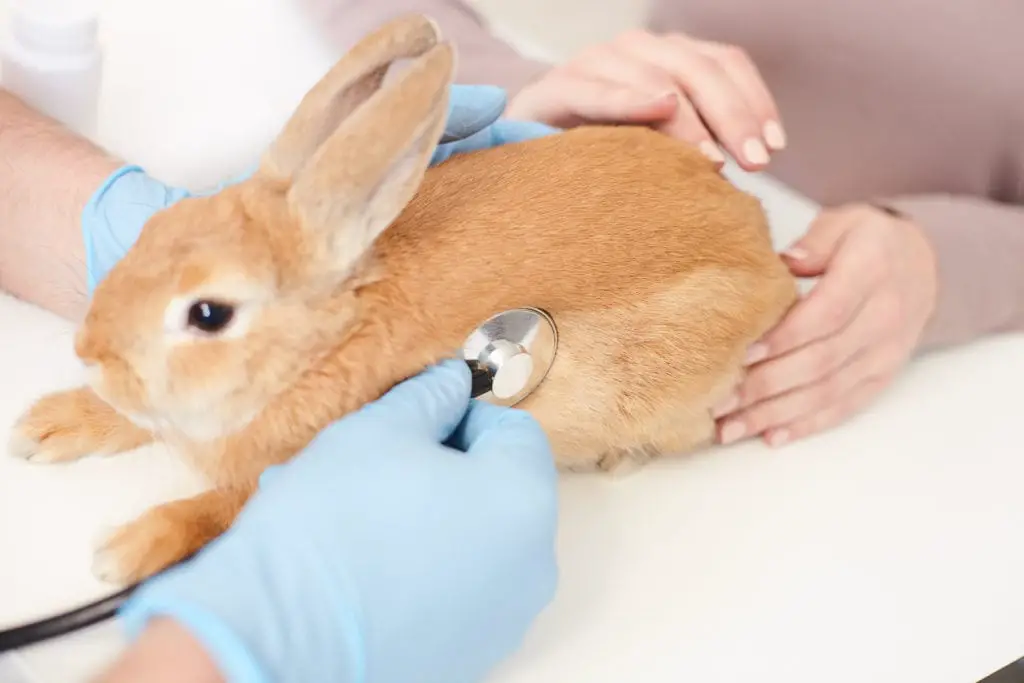
Pet rabbit insurance that ensures a provider that looks out for your furry friend and has detailed a health plan for your pet, is definitely something to take into consideration. It’s important to pick the best plan of action with the best coverage that includes everything you’re looking for.
The cost to insure a rabbit is approximately 10-15 dollars per month but can vary depending on pre-existing conditions, age, and species. Most people elect to not insure their rabbit, but it can be a good option for specialty breeders or reduce costs for routine veterinary visits.
Let’s dive into more detail on pet insurance and whether or not it’s right for you and your furry companion.
General Information About Rabbit Insurance
When your pet is sick and requires a pet visit, having the best plan for you and your pet will be the difference between saving money and giving the best care. When you file a claim with your pet insurance you will be reimbursed for your costs according to the plan much like how human health insurance plans. You can rest assured that your plan can be structured as follows:
- Great for serious medical care (especially if your pet is subject to health problems more than most)
- Having pet insurance saves you thousands of dollars as something as serious as surgeries become easier to manage financially.
- With the annual deductible, along with the reimbursement percentage, the amount you’d pay out of pocket can easily turn into any medication needs.
- Pet insurance reimburses a pet owner’s percentage of what is paid to the vet.
- The insurance will reimburse the pet owners for every covered expense but only up to a set amount.
- The pet insurance will reimburse a percentage of the invoice or the percentage of the overall vet bill. Once the bill is sent as a claim, the provider will give back a portion of the amount you paid.
- Under certain pet insurance plans, you can end up getting as much as 90% back while others may have you end up paying for more.
It’s important to enroll your pet as early as possible. Enrolling them while their young saves you more money, especially if the insurance doesn’t cover the full life cycle of the pet. This can also reduce options and having them enrolled younger means more affordable and lower locks in premium payments.
Remember to ask your veterinarian for advice and recommendations when choosing your insurance plan as they deal with the billing and reimbursement for coverage, procedures, and ailments. They can also give experience with the different pet insurance providers and plans. The clinic itself may prefer certain plans and providers over others and your Veterinarian and give a good suggestion for specific pets you may have.
As each plan is different, there are different levels of coverage for different veterinary medical procedures, health conditions, and other serious occurrences. When considering each plan’s reimbursement policy, this is a major factor to consider in choosing how the insurance will pay for your pet’s medical needs.
If your pet has generally good health, you’d likely pick a plan that covers just that. Whereas other plans offer preemptive care for vaccinations, fleas, ticks, heartworm, etc. If there is a worry for your pet needing expensive emergency care, surgeries, hospitalization, prescriptions, lab testing, illness, or injury, some pet insurances can provide coverage with unexpected medical care.
This can be especially helpful with the pet getting older and specific breeds of the animal. It is also best to find insurance that can cover pre-existing conditions before selecting a plan.
When you compare different pet insurance providers, take a close look at how the overall insurance company has been to customers in the past. Ask yourself the following questions: do current customers say good things overall about the company?
Are the medical costs and overall monthly fees good for my budget? Is it affordable overall with all the medical care I need for more than one pet? Will I receive all the right care when I need it before or after the claim is filed? Having compared each pet insurance provider your research will save you extra worry the next time you take your pet into the vet clinic.
TIP: Along with considering whether or not to get insurance for your pet rabbit, considering vaccines is also something owners contemplate. Do Rabbits Need Vaccines? What You Should Know is the article I wrote that will help you determine, by your location, if vaccines are necessary for your pet rabbit or not.
Types of Rabbit Insurance
- Accident Coverage: This covers any treatments needed if an accident occurs such as burns, broken bones, and other serious injuries.

- Pet Wellness: This plan is more of a routine check-up and for preventative treatments for wellness tests, monthly vaccinations, and other medications such as tick and flea.
- Time-Limited Coverage: With this coverage, it covers treatments up to a set amount over a period of time. If your pet for example had diabetes, this coverage can put forth $1,500 along with a year’s worth of covered care.
- Maximum-Benefit Policies: This plan gives you a set budget on how much you will be reimbursed back after each pet visit.
- Lifetime Coverage: When undergoing ongoing treatments, serious illnesses, surgery, and long-term medical help, this gives the overall worry for financial expenses a rest.
Advantages of Pet Insurance
One of the best things about choosing your pet insurance is that you can also choose your favorite licensed veterinarian with whom you have the pet insurance. A difference between human health insurance and pet insurance is it often causes limitations with certain doctors/providers. This gives pet parents the choice of choosing who they feel comfortable giving their pet care to.
Another advantage is that pet insurance helps with some routine costs that come with having a pet. With monthly medications, checkups, and vaccinations, your pet insurance can cover part of or all the medical services needed. This alone can be worth the cost of the premium payment.
Since you are either a new rabbit owner, or one who is concerned about wanting the best for your rabbit, this Checklist: What You Need to Buy For a New Pet Rabbit will also come in handy. These are a list of resources I’ve compiled over the years that I wish someone would have told me about when I purchased my first rabbit!
Rabbit Based Diseases and Other Serious Health Issues
With rabbits and serious health issues, you should be wary of uterine tumors, myxomatosis, rabbit pox, papillomatosis, rotaviral infection, and calicivirus or also known as rabbit hemorrhagic disease virus. Myxomatosis is the most fatal of domestic rabbits and medical care can be expensive.
Tapeworm and roundworm can be found in rabbit poop which also will require monthly medication to the rabbit. Diseases such as hantavirus, leptospirosis choriomeningitis (LCMV), Tularemia, and Salmonella (which causes infections with children 5 years of age, elderly, and those with weak immune systems). These are all carried through rodent pets, especially rabbits.
LCMV specifically causes the most risk for pregnant women as it causes birth defects and other intellectual disabilities to the unborn baby. Leptospirosis, while sometimes showing no symptoms at all, can cause people to become very ill and can be passed through soil, contaminated water, and infected urine as this is a common cause for human infection/contact.
This is not only in the end to find proper pet insurance for your rabbit but to protect yourself and your family from the diseases mentioned.
Top 5 Pet Insurances
Pumpkin-Most Popular with a 9.8 rating
- Includes coverage for dental care
- 90% reimbursement
- Covers prescription medication and other supplements
- Provides a 10% multiple pet discounts
- Has an annual deductible instead of per claim
- Single plans for each pet
- Easy-to-use website
- No age limit for coverage
Cons: Does not cover pre-existing conditions and limits annual coverage.
SPOT Pet Insurance rated 9.2
- Visit any licensed vet and get reimbursed
- Up to 90% in reimbursements
- 24/7 veterinarian helpline
- 10% on multiple pets discount
- 5 yearly limits to choose from ($5,000, $10,000, $15, 000, $20,000, and unlimited)
- Switch between yearly limit, reimbursement, and deductible for a custom coverage plan.
- Choose any licensed get in the US including specialists.
- Every policy includes a microchip implant for your pet
- Receive free Cesar Millan training tips
Cons: No coverage for exotic animals and has a 14-day waiting time for coverage to come through.
Progressive Pet Insurance rated 9.1
- Affordable plans from even $1/day
- Up to 90% reimbursement
- Choose a deductible plan from $50-$1,000
- Claims can be deposited directly
- Free to visit any licensed veterinarian of your choice
- Pay either premium monthly, quarterly or annually
- Add-on wellness check care plan option
- 24/7 Pet Helpline
- Option for Accident Only Plan
Cons: Multi-pet discount only at 5% and no coverage for exotic animals
Pawp Pet Insurance rated 8.8
- This insurance acts as an emergency fund up to $3,000
- 100% reimbursement up to $3,000 a year
- Up to 6 pets can be covered for only $19/month
- No copay or deductible
- Protects pets of all ages/breeds/preexisting medical conditions
- Online veterinarian access to reduce trips
- Covers emergencies relating to preexisting conditions
Cons: Limited to one emergency visit per year and a 5-day waiting time before coverage starts.
ASPCA Pet Insurance rated 8.2
- Up to 90% in reimbursement
- Online, mail, or fax for member-only submission for claims
- Low rates for multiple pets
- Received an A+ rating with Better Business Bureau (a nonprofit organization that focuses on which businesses to trust)
- Customizable coverage for cancer, hereditary medical conditions, and behavior issues.
- Visit any licensed vet/specialists
- No age limit for new policies
Cons: Coverage only for dogs and cats and annual limits may apply.

With so many options to choose from, the stress for pet care seems to show not one heavy medical bill in the future. It is in best hopes that you can find the best care possible for you and your pets from all the insurance packages available to you.
Other Helpful Resources
- Owner’s Guide: Are Rabbits Hard to Care For? – This article will help first time owners determine if owning a rabbit is right for them or not. Pet rabbits may require more time and attention than you think!
- How to Set up a Rabbit Litter Box in 10 Steps – Being concerned about your rabbit’s health is smart! There are certain steps you should take when setting up your rabbit’s litter box, along with materials that are better to use than others, to ensure your rabbit lives the healthiest life possible!
